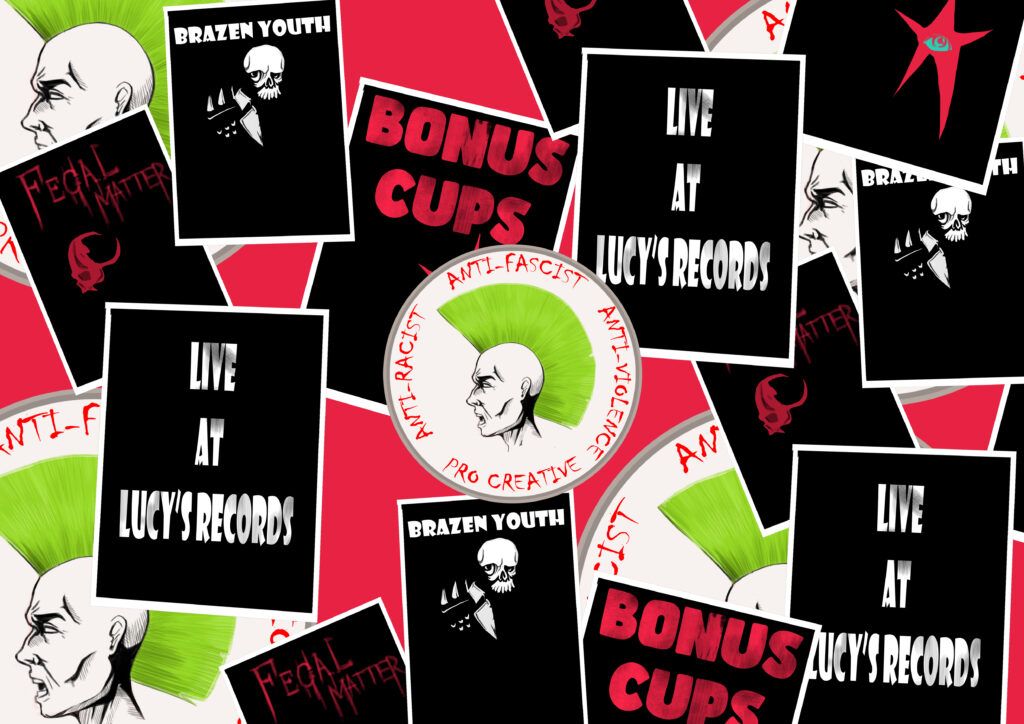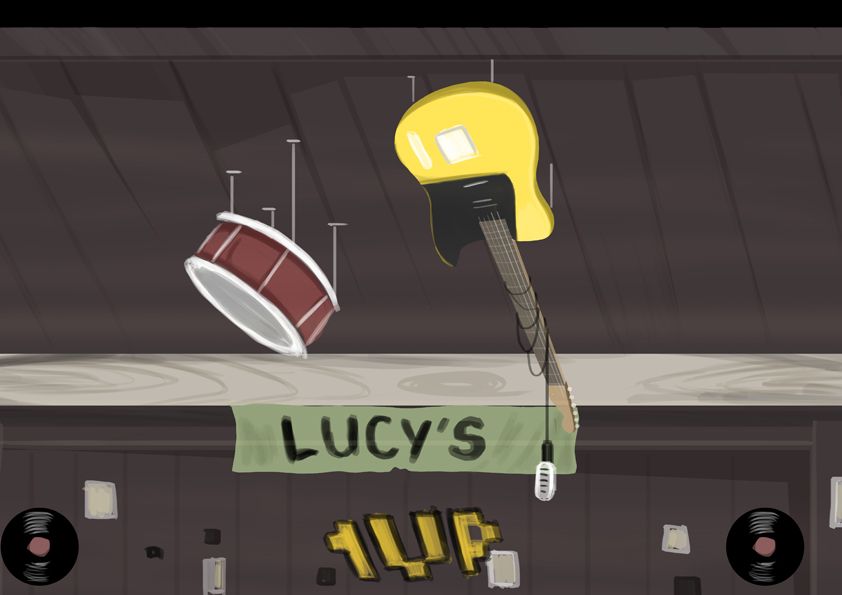1
March, 15th 1996
The bass is heavy in my hands, and my fingers are sore from playing songs fast without a pick. The songs are always fast, but the intensity of playing live drives an even more urgent velocity. I hop on the wooden stage, feeling an added bounce as our singer leaps into a fetal ball, guitar in hand, not missing a note, and then he is back at the microphone to belt the final chorus. I look out at the packed room and can’t believe the size of the crowd. This is our third show and our second at Lucy’s Record Shop. We are the first act of the night, and the big draw is most likely due to the closer, a hard-core band called Brazen Youth, but we had kept the room packed. Indifference usually drove the crowds outside to wait on the sidewalks, but we managed to keep the audience in place and even had some slam dancing and pogoing on the floor below; all good signs.
Being on stage is a blur. I look at Tripp York, our singer and guitarist, for changes and back at Matt Whitford, our drummer, for any cues. It is easy to lose your place despite being well-rehearsed. We took being a band very seriously, as we met three times a week to “get tight.” That was our mantra for a time as we first started practicing in Matt’s garage and later migrated to my parent’s garage. We underwent several name changes in our year of playing: Surrender Dorothy and Chefs of Chicanery are two, I recall. The Wizard of Oz inspired the first, and the second was a reference to The Tick comic book and a spoof on the COC acronym used by Corrosion of Conformity. It was decided both sounded too metal, and we were a pop-core band, or perhaps pop punk, but definitely not metal.
Once we started playing live shows, we decided on the name Bonus Cup, and it stuck. A coffee concoction inspired the name. The Descendents supposedly drank this before shows to get themselves wired and hyped up to play a spastic show, or maybe it was to keep them awake while driving their van on tour, I forget.
We played at Lucy’s five times in our three years of existence. We played shows across four states and several clubs around Nashville, but Lucy’s always felt like coming home, playing on your home field.
2
Kids congregate all around the space at 1707 Church Street, some high school, some college-age. People talk outside, awaiting the bands they came to see. It is always hard to be an opening act, and Lucy’s usually books 3 to 4 bands a show. As each band takes the stage, the crowds are in extreme fluctuation. Sometimes the room is packed; other times, it is a modest showing, and some bands practically clear the room. It often has nothing to do with the band; stepping outside and getting some fresh air is a relief. The sweaty, yeasty smell of so many bodies in a small space and the humidity of breath becomes stifling at times. The burning red faces exit to breathe deep after the exertion of pogoing to the music or the fury of being jarred bodily in a slam dance.
Several people sit along the sidewalk, and others stand around talking outside the building, which is typical on most Friday and Saturday nights. There is always a tension in these nights: the youthful vigor, the desire to see and be seen and participate in the perception of cool, or what might bring judgment in admitting you like the wrong things. Nevertheless, for Nashville’s youth, Lucy’s Record Shop is a door to something else for bored suburbanites venturing into an urban environment.
The store section is full of independent 12-inch and 7-inch cassette tapes, CDs, independent books on politics, music, tattoos, fanzines, art zines, homosexual culture, Riot Grrl, and beyond. This place is true to an alternative way of thinking and participating in society or rejecting it altogether. It is a place that values the independent and Do-It-Yourself approach to art, culture, and music. If you picked up the monthly show calendar, you would see Lucy’s values in the message reprinted every month: “NO RACIST, SEXIST, OR HOMOPHOBIC SHIT TOLERATED.” It brings to mind the Joe Strummer quote, “I think people ought to know that we’re anti-fascist, we’re anti-violence, we’re anti-racist, and we’re pro-creative. We’re against ignorance.” This is a world apart from Music Row Nashville and the Grand Ole Opry.
Punk isn’t dead, but it was hanging on by a thread by the late 90s. Hip Hop, boybands, and Britney Spears had taken over the airwaves. It was a complete redirect from the early 90s when Nirvana broke onto the scene. Lucy’s started hosting all-ages shows in their back room shortly after opening in 1992. Mary Mancini opened the Revolutions Per Minute store after moving from New York. When they started booking live shows, the shop was renamed Lucy’s Record Shop, named after Mary’s Weimaraner. Lucy could be seen moving around the store’s aisles on show nights. Strolling amongst all the young punk crowd, sniffing and licking the willing and unwilling alike.
The early 90s boomed with alternative culture, and a more mainstream acceptance of the punk ethos reached a new generation. Lucy’s was right there at the beginning and carried it through its fruition as boy bands and pop idols again took over the mainstream toward the end of the decade. Lucy’s allowed Nashville to have a thriving punk and indie scene. Local kids could form bands, have a place to play out, meet people from all over the city, and share billing with national acts.
3
March 15th, 1996 cont.
It was at this show that Dallas and John approached me about recording an EP. I had just watched their band, Fecal Matter, play the week before, and I had seen Dallas play many times with his previous band, Fingerhut. I was a big fan of Fingerhut’s sound and energy, so I was slightly surprised when they asked about recording. They had just bought a 16-track recorder and wanted to start recording bands in their basement. I found this concept intimidating since Dallas was a phenomenal guitarist, and John was a much better bassist than I was. We went on to record the SCRAM! EP with them that spring.

I invited their band to join Brazen Youth and us at our next show in Murfreesboro, TN, on March 24th, just a little over a week later, on a Sunday night. Brazen Youth was probably the most popular hardcore band at that time, especially in Lucy’s orbit. We played a successful show with them at Lucy’s, so I thought expanding that success to a different venue would be great. It did not translate, however. Squeezers was a sports bar and not a punk rock venue. It was the kind of venue that catered to bar bands playing classic rock or Stevie Ray Vaughn wannabes that filled Middle Tennessee bars and honky tonks. Our bands mainly played to each other, and a few friends were willing to make the forty-minute drive to Murfreesboro. The plan to introduce ourselves to the Murfreesboro scene had probably been slightly miscalculated. With the rise of Sponge Bath Records in Murfreesboro and bands on their label like the Features and Self-getting airplay, I assumed there would be a hungry audience for young bands, but we were clearly at the wrong venue.
Fecal Matter went on first, but was delayed by a darts tournament. The manager would only allow the bands to start after the games. More signs that we were not the priority for the bar that night. Once Fecal Matter had played, Bonus Cup took the stage. As we were getting ready to play our set, the house music continued to play. After waiting a bit, Tripp got impatient with the bartender for not turning off the music. The bartender said, “If you guys didn’t suck so much, maybe I’d turn the music down.” Then Tripp said something to him about how his educational pursuits landed him a position at Squeezers, which horrified me then. I was thinking, great, we are going to get thrown out. But, looking back, it was ballsy and warranted. Somehow, we finally got things going and made it through our set. And finally, Brazen Youth was supposed to close the show.
I should add that there was quite a bit of underage drinking that night due to Squeezers appointing someone from Brazen Youth’s entourage to check IDs. However, they never finished setting up their gear. Chaos broke out while our band was putting our equipment in our cars. A cash register might have been thrown through a wall after a fight broke out. That show ended Brazen Youth as a band since the singer and drummer got into a disagreement before a single note was played. The fight concluded with us looking for the drummer’s tooth. Ultimately, we could not locate his missing tooth because it was still in his mouth. His lower jaw cracked when the singer slammed the drummer’s head across his knee. So, the crack in his jaw explained the gap between his teeth, not a missing tooth. The police showed up not too long after. My memory was driving away as I saw the blue lights in the distance. Tripp later told me, “Russ, I think you got out as the cops arrived…? I recall being made to stand in a lineup, and some kid with a green Mohawk puked as one of the cops walked right by him. He told me he would be sick, and I was like, hold it.”
After that disastrous show, we would play with From Ashes Rise, which consisted of remnants of Brazen Youth and a few newer recruits. On our final show at Lucy’s, we shared the bill with Booby Hatch, whom Dallas played guitar for by that time. Lucy’s made this networking possible. It felt like we were part of a real scene, and the bands supported each other in recording and booking shows. Lucy’s was the best venue for bands like us. There was respect and a professional atmosphere. Things ran seamlessly, and we never had the mess we experienced in Murfreesboro.
5
Friday, January 30th, 1998. This is the second to last show as the venue winds down. This night features Vic Chesnutt (backed by Lambchop), Lambchop, Paul Burch, and Cyod. This night, the crowd is at capacity. The sidewalk is crowded as people wait to watch one of Lucy’s final shows.
The next night, Lucy’s closed their doors forever. The only thing more fleeting than youth is a rock scene. It burns fast and bright and cannot be sustained, so something newer and younger has to take its place. It is hard to pinpoint what was unique about Lucy’s. The stained gray carpet, the stage and drum riser covered in stickers of bands who played the venue, a toilet you probably wouldn’t want to take a shit in, the dilapidated couch in the front of the store where the punk kids would sprawl out and talk. All these things were just aesthetics, not unique to any music venue. None of those things made Lucy’s what it was for the weekly crowds attending shows. It was an action on the tongues of so many high school kids.
Lucy’s presented an opportunity for a creative outlet in some hole in the wall that could have easily never existed. Lucy’s was a place for a generation of kids to learn a thing or two that Nashville’s corrupt music industry would never have taught them and to seek out something other than what the mainstream dished out. Lucy’s was an anchor for a concept and place to belong for a time and to be part of something essential when it mattered most.

